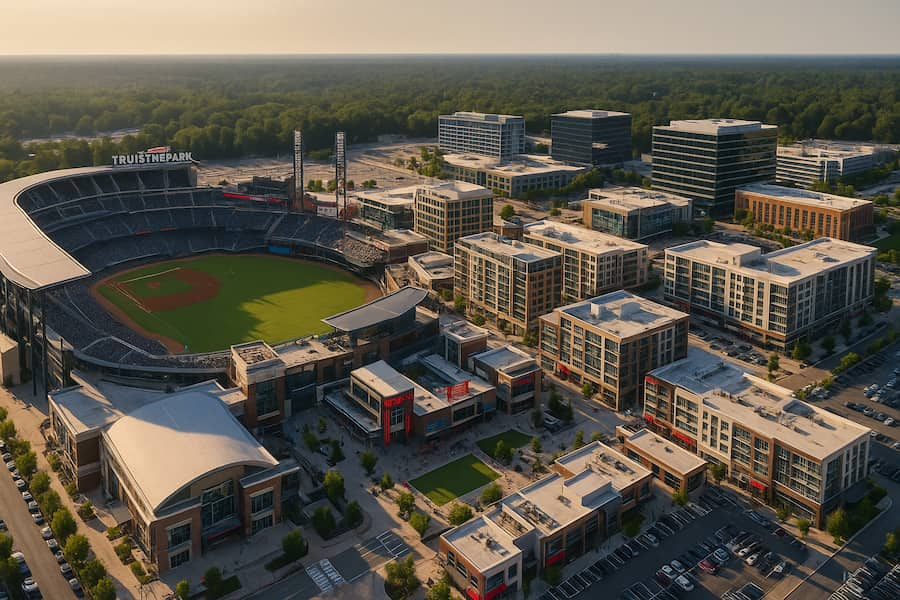
How the Atlanta Braves Built a $1B Real Estate Empire Beyond Baseball
TL;DR:
Behind the Braves’ roar on the field lies a quietly unfolding story, one that’s reshaping their business and Atlanta itself in ways you might never expect…While most sports teams focus on selling tickets and sponsorships, the Atlanta Braves have quietly built a booming $1 billion real estate empire that’s transforming their business—and the city of Atlanta—beyond baseball.
From Ballpark to Billion-Dollar Business
When the Braves opened Truist Park (formerly SunTrust Park) in 2017, they didn’t just build a stadium; they created the foundation for something much bigger. Surrounding the ballpark is The Battery Atlanta, a sprawling 75-acre mixed-use development filled with restaurants, retail, offices, hotels, a concert venue, and over 500 apartments.

The Battery draws in nearly 9 million visitors annually, three times more than the number of fans attending Braves games, making it a year-round entertainment hub. This real estate venture generated $67 million in revenue in 2024 alone, delivering nearly half of the team’s overall cash flow despite representing just 10% of total revenue.
Why The Battery is a Game-Changer
Traditional sports franchises rely heavily on ticket sales, media rights, and sponsorships, but these income streams are seasonal and can fluctuate with team performance. The Braves’ smart real estate strategy provides a stable, lucrative revenue stream outside of the baseball season.
Here’s how it works:
- The Braves own or have stakes in various parts of The Battery but don’t operate the properties themselves, keeping operating costs low (under $10 million annually).
- They lease office and retail spaces to major corporations like Home Depot, Comcast, Truist, and Papa John’s, many paying 15-20% premium rents simply for being next to the stadium.

- The team benefits from high occupancy rates (90%+) and long-term lease agreements with escalating rents.
- Revenue from The Battery isn’t subject to MLB’s revenue-sharing system, so the Braves keep all the profits.
Real Estate Fuels Financial Stability
While the Braves’ baseball operations generate impressive revenue, around $595 million in 2024, player salaries and baseball-related expenses are enormous, totaling over $500 million. In fact, baseball operations alone resulted in a slight loss of $18 million last year.
That’s where The Battery’s real estate profits play a crucial role. By generating $45 million in operating profit, the real estate business effectively subsidizes the team’s expenses and strengthens the franchise’s financial health.
Expanding the Empire: Pennant Park and Beyond

The Braves recently acquired 34 additional acres adjacent to The Battery, called Pennant Park, increasing their footprint by 30%. With 85% of this new space already leased and 2,700 new parking spots added, the team is poised to further grow its real estate revenue.
This expansion underlines the Braves’ commitment to building a long-term, diversified business that blends sports, real estate, and entertainment.
What Other Sports Teams Can Learn
The Braves are pioneers in a new model of sports franchise revenue generation. Their approach is a blueprint for other teams looking to reduce dependence on game-day revenues and volatile media deals.
By turning stadium neighborhoods into year-round destinations, teams can create sustainable cash flow, attract corporate tenants, and enhance fan experiences. Real estate development can transform a sports franchise into a powerful urban development force and a more valuable business overall.

The Future of Sports and Real Estate
The Atlanta Braves have shown that sports teams can be real estate developers and operators just as much as they are baseball organizations. With a $1 billion real estate portfolio fueling profits and growth, they’re leading a shift in how professional sports teams operate financially.
As other franchises follow suit, the era of sports stadiums surrounded by thriving entertainment districts is here to stay, and fans will reap the benefits of better experiences both on and off the field.

For more in-depth coverage of major leagues, teams, and off-the-field business moves, check out the latest sports news USA updates!